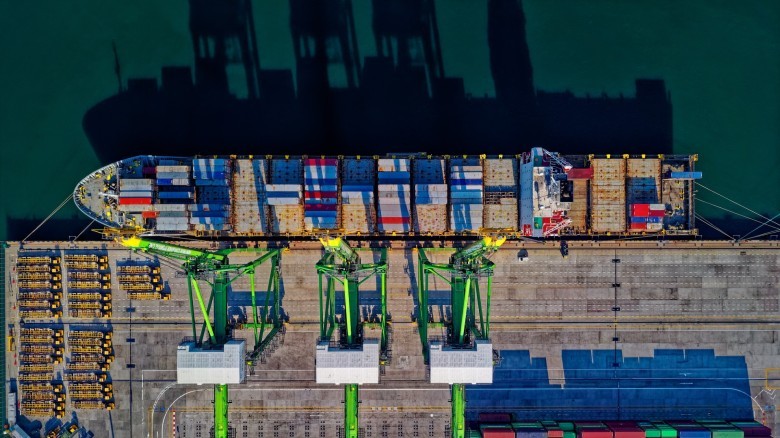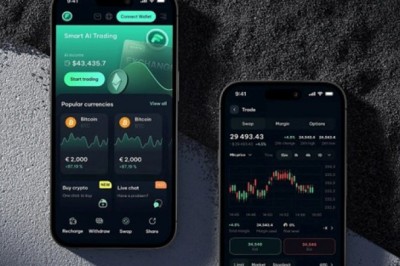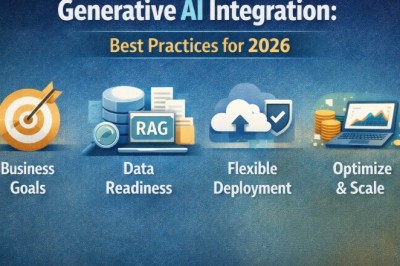views

Photo by Tom Fisk
Maritime trade has always been the backbone of global commerce, with container terminal services playing an indispensable role as pivotal hubs within the intricate web of the supply chain.
Over time, the traditional methods employed in port operations have grappled with notable challenges relating to their efficiency, lack of transparency, and insufficient sustainability. However, a solution arises in the form of smart ports, which harness the power of the Internet of Things (IoT) to tackle these issues head-on.
This article is all about examining how the utilization of IoT is enhancing operational efficiency and revolutionizing the landscape of maritime trade. Let’s dive in!
Understanding Smart Ports and IoT
Smart ports are technologically advanced maritime facilities that leverage the power of the IoT.
IoT involves interconnecting devices and systems through the internet to collect and exchange data, enabling smarter decision-making and enhanced operations.
In the context of ports, IoT integrates various elements, such as sensors, cameras, and communication networks, to create an interconnected ecosystem that transforms the way port activities are managed.
Key Benefits of Smart Ports and IoT
Before we delve into the specific applications of IoT within smart ports, it's important to highlight some key benefits that this integration brings to the table:
- Enhanced Efficiency: IoT-enabled devices and systems streamline various processes within smart ports, leading to quicker turnarounds, reduced waiting times, and optimized resource allocation.
- Real-time Insights: The real-time data streams generated by IoT devices provide stakeholders with accurate, up-to-the-minute information about port operations, enabling informed decision-making.
- Improved Safety: IoT sensors can monitor equipment, infrastructure, and environmental conditions, helping to identify potential safety hazards and mitigate risks.
- Environmental Sustainability: IoT applications can lead to reduced energy consumption, optimized transportation routes, and better waste management, contributing to greener port operations.
- Data-Driven Decision-making: With access to a wealth of real-time data, smart port operators can make more accurate and strategic decisions. This data-driven approach optimizes operations, reduces inefficiencies, and improves overall business outcomes.
- Customer Satisfaction: The transparency and efficiency fostered by IoT in smart ports translate into improved customer experiences. Faster cargo handling, accurate tracking, and timely communication contribute to higher customer satisfaction levels.
IoT Applications in Smart Ports
From enhancing cargo tracking precision to improving supply chain visibility, the impact of IoT reverberates through every facet of smart port operations, promising enhanced effectiveness and unprecedented insights.
1. Enhancing Container Tracking
IoT-enabled sensors ingeniously affixed to containers facilitate a revolutionary enhancement in container tracking. These sensors empower stakeholders with precise insights into the location, condition, and status of cargo by harnessing real-time data streams.
This heightened transparency mitigates risks associated with theft, damage, and delays and also fosters an unprecedented level of trust and reliability in the logistics ecosystem.
2. Real-time Fleet Management
The convergence of IoT and fleet management ushers in a new era of operational efficiency. Through seamless connectivity, port authorities gain a dynamic view of their vehicular assets, allowing for real-time monitoring, optimization of routes, and strategic scheduling.
This orchestration not only minimizes traffic congestion but also curtails fuel consumption, thereby fostering a sustainable and cost-effective approach to managing the bustling port environment.
3. Predictive Maintenance of Equipment
At the heart of smart port operations lies the predictive prowess of IoT-enabled sensors within critical machinery. These sensors continuously collect and analyze performance data, enabling them to forecast maintenance requirements before breakdowns occur.
This preemptive strategy safeguards against costly downtime and ensures a seamless flow of operations, bolstering the overall resilience of port facilities.
4. Efficient Resource Allocation
Harnessing the data-rich landscape fostered by IoT, smart ports optimize resource allocation with unparalleled precision. The fusion of cargo volume statistics, vessel schedules, and labor availability data enables port administrators to make informed decisions, mitigating bottlenecks and streamlining processes.
This data-driven orchestration translates to heightened productivity and a more synchronized port ecosystem.
5. Streamlining Cargo Handling
The influence of IoT extends to the very heart of cargo handling operations within smart ports, leveraging sensors and RFID technology. This transformation turns the once labor-intensive task of loading and unloading ships into an automated symphony of efficiency.
Not only does this expedite operations, but it also minimizes the risk of human error, raising the standard of cargo handling reliability.
6. Improving Supply Chain Visibility
The infusion of IoT into smart ports injects a new level of visibility into the global supply chain. Real-time data streams capture the movement and status of cargo, providing stakeholders with an unparalleled understanding of the supply chain's intricate dynamics.
This transparency facilitates proactive decision-making, enabling rapid responses to potential disruptions and enhancing overall supply chain resilience.
Challenges and Security Concerns
However, the integration of IoT in smart ports also poses challenges. Data privacy and cybersecurity are critical concerns, as interconnected systems are vulnerable to cyberattacks. Additionally, integrating diverse technologies and legacy systems can be complex and costly.
The good news is that the maritime industry's history of adaptability and innovation suggests that these challenges can be overcome through collaboration, investment in cybersecurity, and strategic planning.
As we explore the applications of IoT within smart ports, it's important to keep in mind the efforts and solutions required to navigate these obstacles and ensure the smooth integration of technology for the benefit of the entire ecosystem.
The Future Landscape of Smart Ports
The evolution of smart ports continues. Artificial intelligence and automation are expected to play a more significant role in optimizing operations through predictive analytics and autonomous systems.
Sustainability will be a focal point, with smart ports embracing eco-friendly practices to minimize their environmental impact.
As the future unfolds, smart ports will likely become a standard in the global trade landscape, further solidifying their role in shaping the industry's trajectory.


























Comments
0 comment